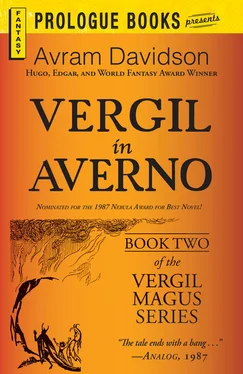Avram Davidson - Vergil in Averno
Здесь есть возможность читать онлайн «Avram Davidson - Vergil in Averno» весь текст электронной книги совершенно бесплатно (целиком полную версию без сокращений). В некоторых случаях можно слушать аудио, скачать через торрент в формате fb2 и присутствует краткое содержание. Жанр: Фэнтези, на английском языке. Описание произведения, (предисловие) а так же отзывы посетителей доступны на портале библиотеки ЛибКат.
- Название:Vergil in Averno
- Автор:
- Жанр:
- Год:неизвестен
- ISBN:нет данных
- Рейтинг книги:3 / 5. Голосов: 1
-
Избранное:Добавить в избранное
- Отзывы:
-
Ваша оценка:
- 60
- 1
- 2
- 3
- 4
- 5
Vergil in Averno: краткое содержание, описание и аннотация
Предлагаем к чтению аннотацию, описание, краткое содержание или предисловие (зависит от того, что написал сам автор книги «Vergil in Averno»). Если вы не нашли необходимую информацию о книге — напишите в комментариях, мы постараемся отыскать её.
Vergil in Averno — читать онлайн бесплатно полную книгу (весь текст) целиком
Ниже представлен текст книги, разбитый по страницам. Система сохранения места последней прочитанной страницы, позволяет с удобством читать онлайн бесплатно книгу «Vergil in Averno», без необходимости каждый раз заново искать на чём Вы остановились. Поставьте закладку, и сможете в любой момент перейти на страницу, на которой закончили чтение.
Интервал:
Закладка:
However.
After merely a moment, a manservant appeared, one whom Vergil had seen before; this one gave him the sort of ridiculous bow of the sort seen in pantomimes and street-plays, the spare-two-groats-for-the-bath-boss sort. At first the visitor felt he was being mocked, almost at once he thought that perhaps the man had never in his life seen any real sort of bow performed; this was, this was Averno. And so, the lumpkin having straightened up and made an equally absurd gesture, Vergil, following it, entered the room where the woman sat and spun.
She rose as he entered, then, the spindle dropping, she lurched to catch it, caught it, gazed down at it a moment as though not sure what it was. Then she sat down again. After a moment she said, “Poppaea. I am called Poppaea. Did you know? Poppaea Rano.” (“Matron,” he said, with a bow she did not see.) “Rano sent to tell me you were coming.” Her voice was clear and had no particular accent; neither did it seem to have any particular weight of meaning.
After a moment, as she stayed still, clumsily working her wool, and did not ask him to seat himself, he looked about, and seeing, at a respectable distance, to be sure a bad chair — but still, a chair — he seated himself. Another slow-passing moment. There seemed nothing wrong with her slender fingers, there were no marks of shackles on her wrists, merely this was an art which she had not. “Will Magnate Rano be returning presently?” he asked.
“I don’t know,” she said simply, and with the slightest air of surprise that he might think she should. Well, here there would be no discussion of readings from Homer; Sappho had woven her violets in vain as far as any analysis of her or anyone else’s poems was concerned. It was up to him to close the gate against silence, if the gate was to be closed at all. And so, with an inward sigh, he asked, by and by, “Do you have children, Matron?” At once he felt his words as a scalding draft in his mouth, but he could not call them back again.
“Children die young here,” she said. “Not many children are born here.” Her fingers flexed the supple thread, the thread broke and she gathered the fiber again. “I have had two children here. . well, they were born here and they died here. The air was too thick for the older, I think, she had trouble breathing it. And the second had a disease. . what do they call it? Anthrax? It is worse with some. At least mine did not fall into a pool of boiling water or stumble into a fire-hole.” She gave him no chance to change the conversation, nor even to think of how it might be changed; the clear voice, devoid of passion, it seemed, and even concern, went on. The gate had been closed against silence. “When he died, my second one, I recollected and felt I understood that story, oh, I don’t recall where it is from, of a place where people weep when a child is born and they rejoice when it dies. But until then I thought, how horrible. Of course I didn’t really rejoice. ‘Sleep well, now,’ is what I said. And since then Rano says he asks nothing more of me, only to spin. ‘A woman must spin,’ he says. Rano says.”
She repeated this as her fingers gathered and the spindle whirled.
“I don’t do it well, but one must do something, and — ” She broke off.
She sighed a very small sigh. A thin sigh, he thought it might be called — appropriately: she was so thin herself. “We are rich here, we magnates and matrons, and so we may afford amusements. But we don’t spend money on them, really, we women here. Brosa. Do you know what her amusement is? She abuses her servants. Really.” Not likely, Vergil thought, that Poppaea could abuse the grim figure whose dirty toes were just within his sight, as she rattled her dried beans from pan to pan. And an odd duenna she was…. “Well, to be less delicate, she tortures them. Oh, not too heavily, no. They are always able to go back to work afterward. I know what Me-lanchthus’s matron does, she does her hair, she has wax-pictures of different hairstyles, and she copies them and does her hair and she looks in her mirrors and then she undoes and then she does it all over again. Grobi, she keeps the accounts; fancy me keeping Rano’s accounts! Do you know who does? You don’t. You will. And Haddadius’s woman, what’s-her-name, takes care of her children. Ask her if she has children.” Again he felt that scalding draft in his mouth, but she was not trying to punish him, the glancing look she cast at him at once after saying this was merely quizzical. “She has quite a lot of them, and she dresses and feeds them and talks with them and plays games…. Actually, of course, no. She has no real children. They are of course all mommets, dolls. Mommets are dolls and poppets are dolls, too; isn’t that curious?”
He had been looking down, half trying to make out the designs in the mosaic-tiled floor; now he looked up. She had been looking at him, but her gray eyes fled direction as he lifted his own.
He said, “And you do nothing, then, save spin? Have you no amusements? Even inexpensive ones?”
She nodded, and gathered wool from the distaff. “I read. That is, I am read to. Rano allows me to sell the thread and yarn, and, well, they aren’t really very good, but it’s good wool, that ’s good, it can be used again to make better thread and yarn, and I have no need for money, so there is someone who takes away my basketful and in return brings me books and I am read to. While I spin. When one of the Greeks can be spared to do it, who can read Latin, too, you know. And after they are read, the books go back. In that box there is the one the Greek, Demou he’s called, was reading to me, but he was called to the warehouse for work and he hasn’t yet come back.”
The house of Rano was one of the older ones, black and squat and reeking, although attempts had been made to give it some sort of gloss, as witness the floor — at this exact moment the she-troll cleaning beans cleared her nose and throat and spat upon the floor adjacent her — and the furnishings (as though furnished from some captured town, the troops having had their three-day plunder, the followers allowed three days more before the torch was set and all these furnishings gathered in haste late upon the afternoon of the sixth day). As for the box indicated, it was the sort of box that a yeoman farmer might have purchased in some good year, long ago, the taxes being paid and for once the larder and the corn-cribs full. He knew that sort of box full well.
“Would you like me to read to you?” asked he. Where was Rano? Was he never coming back?
And she answered, her eyes so low cast down, “If the master wishes. It would be very kind.”
He opened the box, it contained the usual jumble of broken fibulae and bracelets sans catches, here a charm and there a bauble; and set aside from all of that a smallish book, a codex in form and binding and not a scroll. “Where shall I begin?”
“Where you may be pleased. Perhaps he marked where he left.” She pinched off a bit of wool and was about to add it to the thread, and it broke; she caught the spindle and, with a sigh, made to mend the work. The servant, likely slave, had indeed left a bookmark; thither Vergil turned. A glance showed him the book was entitled The New Anabasis, and he was sure that he had never heard of it and that it deserved no such grand titule. The calligraphy lacked the cunning of the professional book-copyist; whichever old soldier had passed declining years in composing the work had probably pressed his own servant into use: whichever one could, as it chanced, belike, write: to scratch and scribble with a stylus into cold wax was one art, but to make and mend a pen and write cleanly with slow-drying ink — this was another art yet. And a harder one.
Читать дальшеИнтервал:
Закладка:
Похожие книги на «Vergil in Averno»
Представляем Вашему вниманию похожие книги на «Vergil in Averno» списком для выбора. Мы отобрали схожую по названию и смыслу литературу в надежде предоставить читателям больше вариантов отыскать новые, интересные, ещё непрочитанные произведения.
Обсуждение, отзывы о книге «Vergil in Averno» и просто собственные мнения читателей. Оставьте ваши комментарии, напишите, что Вы думаете о произведении, его смысле или главных героях. Укажите что конкретно понравилось, а что нет, и почему Вы так считаете.












